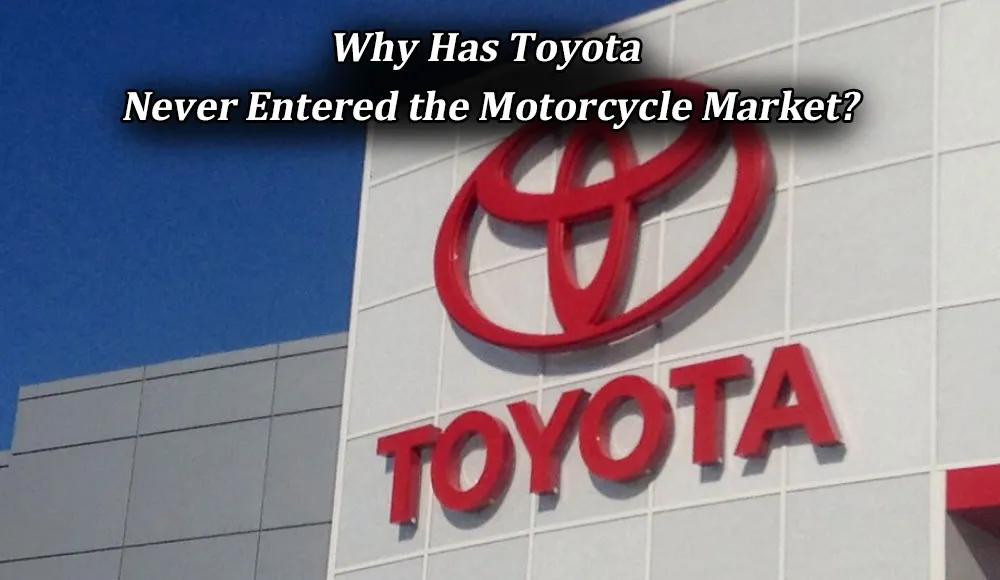As an avid automotive enthusiast and a keen observer of industry trends, I often find myself pondering the strategic decisions of major players in the field.
Today, I want to delve into a particularly intriguing question: Why doesn’t Toyota, a giant in the automotive world, manufacture motorcycles? This question isn’t just a curiosity for car buffs, but also a significant point of discussion among business strategists and market analysts.

Toyota’s Core Business and Brand Identity
Understanding Toyota’s Market Position
Firstly, let’s consider Toyota’s brand identity. Known globally for its cars and larger vehicles, Toyota has carved out a reputation for safety, reliability, and family-friendly transportation. This brand image is not just a marketing strategy but a core part of their business philosophy. It influences everything from vehicle design to customer service. Stepping into the motorcycle industry, which often appeals to a different consumer mindset, could dilute this carefully cultivated image.
The Business Strategy
Toyota’s strategy has always centered around optimizing and innovating within their chosen market segments. This focus has led to breakthroughs in hybrid technology and significant advancements in fuel efficiency and safety features. Diversifying into motorcycles would mean diverting resources from these areas of expertise. In my view, sticking to their strengths has allowed Toyota to maintain its position as a leader in the automotive industry.
Market Dynamics and Consumer Base
A Different Market Landscape
The motorcycle market operates on dynamics distinctly different from those of the automotive sector. For instance, motorcycles are often seen as lifestyle products rather than practical family transportation. This perspective significantly impacts purchasing behavior and brand loyalty.
The Contrast in Consumer Base
Toyota’s consumer base largely consists of families and professionals looking for reliable, safe, and efficient transportation. In contrast, the typical motorcycle buyer often prioritizes aspects like style, speed, and a sense of adventure. This mismatch in consumer priorities presents a significant challenge for Toyota if it were to venture into motorcycle manufacturing.
Financial and Strategic Considerations
The Cost of Diversification
Entering the motorcycle market isn’t just a matter of producing a new type of vehicle. It involves developing a new supply chain, establishing a distribution network, and significant investment in research and development. The costs are substantial, and for a company like Toyota, the return on investment might not justify the venture, especially when their current automotive segments continue to thrive.
Strategic Focus
Toyota’s strategic focus has increasingly leaned towards emerging technologies such as electric vehicles and autonomous driving. These areas promise a future of sustainable and smart transportation solutions, aligning perfectly with Toyota’s vision. Venturing into the motorcycle industry, which is still grappling with these technological shifts, might not align with Toyota’s forward-thinking approach.
Toyota’s Focus on Future Technologies
Leading the Charge in Innovation
Toyota’s commitment to innovation is evident in its extensive investment in electric and autonomous vehicle technologies. These developments are not just about staying ahead of the curve; they’re about shaping the future of transportation. The motorcycle industry, while progressing, is still catching up in these areas. Toyota’s decision to focus on their strengths in automotive innovation seems like a strategic choice in line with their vision for a sustainable future.
Why Diverge?
Given their success and leadership in the automotive sector, one might wonder why Toyota would need to diversify into motorcycles. The automotive industry, especially with the advent of electric and autonomous vehicles, offers vast potential for growth and innovation, arguably more so than the motorcycle sector.
Conclusion
In conclusion, Toyota’s decision not to manufacture motorcycles makes sense when viewed through the lenses of brand identity, market dynamics, financial and strategic considerations, and their focus on future technologies. As a company, Toyota has always been more than just a car manufacturer; it’s a brand that represents reliability, safety, and forward-thinking innovation. Venturing into the motorcycle market, at least for now, does not align with their strategic vision or brand identity.
It’s fascinating to observe how a company’s history, market position, and strategic choices shape its trajectory. In the case of Toyota, their unwavering focus on their core business and the future of automotive technology explains why they’ve steered clear of motorcycle manufacturing. As we move forward, it’ll be interesting to see how Toyota continues to innovate and lead in the automotive sector, staying true to its identity and strategic priorities.


